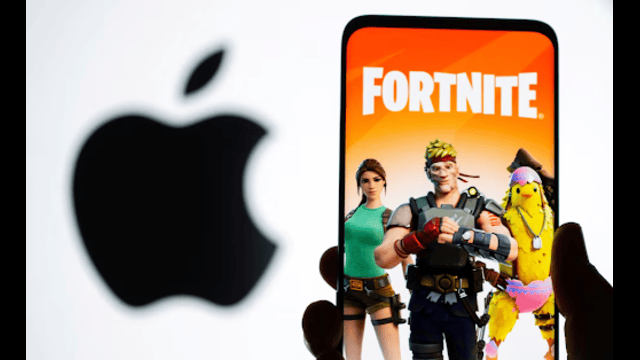
The popular game Fortnite: Battle Royale by Epic Games is seen on an Apple iPhone in Washington, D.C., on May 10, 2018. The game, which now has 45 million players, gained widespread popularity after it was made free to play. (Photo: Andrew Harrer/Bloomberg)
The long-standing feud between tech giant Apple and game developer Epic Games has once again flared up—this time over Fortnite’s availability in the European Union and the United States. Epic Games has claimed that Apple is blocking its latest app update, stopping users from downloading Fortnite through both Apple’s U.S. App Store and the Epic Games Store in the EU.
In a statement shared on social media, Epic revealed that Fortnite will remain unavailable on iOS devices around the world until Apple lifts the restriction. “Now, sadly, Fortnite on iOS will be offline worldwide until Apple unblocks it,” the company posted on X (formerly Twitter).
Apple, however, has denied these claims. A company spokesperson clarified that Apple did not remove the live version of Fortnite from alternative platforms in Europe. According to Apple, it simply requested Epic’s European division, Epic Sweden, to modify the app and remove the U.S. App Store option from the update. This way, the rest of the world wouldn't be affected by ongoing issues in the U.S.
The core of this conflict ties back to the companies’ long history of courtroom battles. Epic Games has openly challenged Apple’s control over the App Store, especially its policy of taking a cut from in-app purchases. Epic argues that these charges reduce developer earnings and limit consumer choice.
Last week, Epic took steps to bring Fortnite back to U.S. iPhones for the first time in three years. This move came after a U.S. judge ruled that Apple must allow app developers to guide users to external websites for purchases—circumventing Apple’s usual commission. However, Apple hasn’t confirmed if it will approve Fortnite’s return to its U.S. store.
In the meantime, Epic grew impatient. After not receiving a response to its initial submission, the company withdrew the app and resubmitted it on Wednesday with updated content to align Fortnite with its other platforms.
This dispute has broader implications for the gaming and tech industries. It brings to light the challenges developers face when trying to operate across multiple regions under varying digital rules. The EU has stricter regulations on digital marketplaces, requiring Apple to allow third-party app stores like Epic’s. The U.S. is still navigating its own legal path with fewer rules in place, which creates friction when a company like Epic tries to launch the same app globally.
As of now, Fortnite fans on iPhones remain in limbo, with no timeline for when the game might return. The situation underscores the ongoing power struggle between Apple and developers, who want more control over their own content and revenue.















